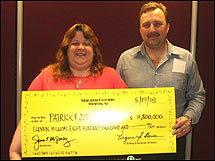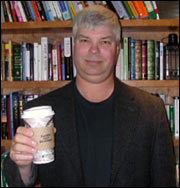New York (CNN/Money) -
Who doesn't dream of the big windfall? After all, it's the quintessential American Dream. Make something of yourself. Buckle down and strike it rich.
Horatio Alger, Jr. knew this when he penned his famous tales of decent, poor individuals who hit the big time. Turns out, we still can't resist a good rags-to-riches story. After all, such tales give hope, even when the chips are down. So, with a nod to Horatio Alger, more stories of those who made good:
The celebrities
Celebrities seem to shine brighter when they've got humble beginnings.
Consider the case of singer Jewel, who was once so broke she lived in a van. She spent her childhood on a farm near Homer, Alaska where she milked cows and sang Alaskan folk tunes with her dad.
She left when her musical talent got her a scholarship to Interlochen Arts Academy in Michigan. And when she graduated and moved to be with her then-divorced mom in San Diego, California, money was so scarce that her mom, also a singer, suggested they live in vans to save rent money and concentrate on their music.
| More Money Dreams
|

|
|
|
|
When she finally signed her recording contract, Jewel told People magazine that she got a check for $100,000 but was so used to being poor, she was too afraid to spend it, and in fact, didn't want to do anything with the money but keep it safe in a bank. Now, of course, Jewel is in the latest issue of People showing off her glamourous new look -- but hey, she's earned it.
Then there's J.K. Rowling, author of the best-selling Harry Potter series. Like budding singers, struggling writers see their fair share of overwhelming bills. Rowling was no exception. Once so destitute as a single mom, she was forced to go on welfare.
But her fate changed when she had a sudden vision of Harry in her mind as she rode a train from Manchester to London. She immediately started writing ideas, which would blossom into the world-famous Harry Potter series. Rowling's wealth then soared. In April, the Sunday Times reported that Rowling is now worth $444 million -- more than the Queen of England.
The entrepreneur
August 21, 1982. That was the day Thomas Chen landed at Kennedy Airport from Taiwan. He was 27, had little cash, spoke no English and knew only one person in his new home.
"I came to America to find opportunity," he says simply.

By most accounts, he's achieved that goal. Today, Chen is president and one of the co-founders of Crystal Window & Door Systems, which last year booked $42 million in sales and has some 450 employees working at offices in eight states.
Yes, the soft-spoken man is rich. However, money isn't this entrepreneur's only animating force.
"After a point, the money isn't important," Chen insists. "You want your dream to keep going. I want to keep expanding our business. The second dream is to create more jobs and to give back to the community."
It didn't take long for Chen to start adjusting in his early days in New York. Within two weeks of arrival he found a job working for a moving company. It paid $40 a day, and Chen considered himself lucky to get it.
"Because of the language barrier, I couldn't do anything," he recalls. "Most of the [available] jobs were low-paying, labor jobs. I needed to learn the language first."
Within a month of his arrival, Chen had signed up for English classes, spending his early earnings on private tutoring and group classes.
The money that was left over was stashed into savings (he received raises, and found better-paying jobs as his language skills improved). Within 18 months, Chen had salted away $10,000. A former metal worker in Taiwan who had never been to college, he decided it was smart to spend the money on a business he'd know best: welding.
In his basement apartment, he fashioned steel into window bars and gates, then sold the safety devices to customers in Chinatown and Flushing. Meanwhile, he read books and took classes on business management. The research paid off; He did well enough to start Crystal in 1987 with two partners.
Though his finances and lifestyle have change drastically, Chen has acute memories of his not-so-distant past. And because of his experience, he is committed to hiring recent immigrants who have similar dreams of success. To help them, Chen's ensured that Crystal provides free English classes for employees. He also has given Queensborough Community College a $250,000 endowment to provide scholarships so immigrants can enroll in the school's intensive English classes for free.
"He's not only a donor, he's a role model," said college president Eduardo Marti.
The winners
Last January, Jodi and Patrick Southard were enduring "the worst financial month" they ever faced. The Avenel, N.J. couple had switched to a bi-weekly mortgage schedule, forcing them to make three house payments within 45 days -- on top of paying lingering Christmas bills.

February brought no relief: The transmission in their truck blew up. "It felt like we were in a hole and the more we dug out, the more it caved in," said Jodi.
Their fate, and finances, changed dramatically in early May, when they won New Jersey's $11.8 million "Pick-6" lottery jackpot. After taxes -- and opting for the cash-out option (as opposed to an annuity) -- the two walked away with a cool $4.06 million.
Jodi wasted no time quitting her job as a data entry clerk, though she still isn't sure what comes next. Patrick hasn't quit his job as a service manager for a tire company, although he's toying with the idea of starting a business.
"It still feels unreal," says Patrick.
Still, the couple already understands that, whatever they do, they need to make thoughtful financial choices. Two out of three lottery winners burn through their cash within five years, and some even go bankrupt. (For more on those poor souls, see Riches to rags: Millionaires who go bust.)
The one smart play they have made? Putting money aside for their children's education.
"My son starts high school next year and he's very interested in marine biology. [And] just weeks ago I was thinking, 'What are we going to have to do to get him a [college] education?'" said Jodi. "You always want to do more for your kids, and to know I can send them anywhere is fantastic."
The inventor
At one point in his life, Jay Sorensen managed a gas station in Portland, Ore. Then the company pulled out of town. So he dabbled in real estate. By his own account, he "wasn't very good at it."
Floundering, Sorensen wondered what he could do to support his family. The answer came when he spilled coffee on his lap.

"It got me thinking that there had to be a better way," said Sorensen, who began to notice that other coffee-house patrons were holding steaming cups between their thumb and forefingers to avoid burning their hands.
Sorensen's solution? A cardboard sleeve that would fit around the coffee cups.
He developed the idea, then offered it to Starbucks. The then-nascent chain wanted exclusive rights and it was "dragging its feet" about the product. So Sorensen went out on his own, putting his last finances on the line to found his company, Java Jacket.
"At that point I had about six months of living expenses," he said.
Sorensen borrowed $3,000 from his parents to hire a patent attorney, and he ended up piling up credit card debt to have 100,000 coffee cup jackets made from waffled, recycled cardboard.
"I had to pay for the order up front," he recalls. "It seemed like a ton at the time."
The day he picked the prototypes in his pickup truck, Sorensen returned to the cafe where he had originally spilled the coffee on his lap. He had no appointment but was told he could see the owner if he was willing to wait a bit.
While he waited, he read about a coffee trade show to be held a week later. He had no money to attend. A few minutes later he was introduced to the cafe owner, who immediately bought some jackets.
"He was kind enough to ask, 'Do you need a check now?' I said, 'Sure, that'd be nice,'" laughs Sorensen. He promptly used the money to attend the trade show, where he got orders from 150 cafes. His wife, Colleen - now company CEO - followed up with hand-written notes and a sample sleeve to the other 3,500 trade-show attendees.
The efforts paid off big time. Today, the family-owned company sells between 20 million and 25 million sleeves a month, including neighborhood cafes to national chains.
The success is as sweet as that first sip of coffee in the morning. But one of the things the couple enjoys most is being able to give to others in need. Java Jackets supports numerous charities, including Make-a-Wish Foundation, the Humane Society of the United States and Coffee Kids, which provides aid to families and children who live in coffee-producing countries.
"We've been lucky," says Sorensen.

|

